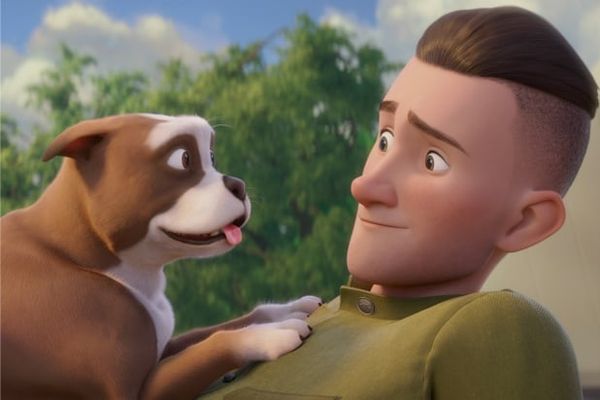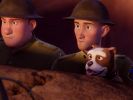Eye For Film >> Movies >> Sgt Stubby: An Unlikely Hero (2018) Film Review
Sgt Stubby: An Unlikely Hero
Reviewed by: Jane Fae

“And when they ask us, how dangerous it was, Oh, we’ll never tell them…
…no, we’ll never tell them:
We spent our pay in some cafe, And fought wild women night and day, ‘Twas the cushiest job we ever had.”
Lyric from “And when they ask us,” Oh What a Lovely War.

As serious lyric, that would be beyond words tasteless. But of course, that is the final scene in the ultimate anti-war film, pointedly juxtaposing the numberless dead, casualties of military incompetence and pride, with the jaunty claims of those who boasted it would be “over by Christmas”. That lyric, which parodies a song by Jerome Kern, was for a long time attributed to “unknown”; more recently it has been credited to Cole Porter in one of his more bitter moments.
Context matters and narrative can never be independent. Imagine, for an instant, had Mel Brooks delivered Springtime for Hitler - another masterpiece of deceived expectations that achieves its effect by counterpointing Nazi ideology and high-kicking showgirls – as serious, or seriously light-hearted, musical offering. Oh, the stunned expressions.
Which is where I ended up with Sgt Stubby. The plot is taken from a true story about a dog who went to the front during the First World War, killed rats, saved lives, outed a spy and finished the war the most decorated mutt in history. So far, so loveable, and one can see how director Richard Lanni imagined there was gold at the bottom of this golden-hearted tale.
Unfortunately, like the eponymous tail from which Stubby took his name, the gold is in short supply. More, the cumulative effect of the 'cutesification' of war that this effort represents leaves a very nasty taste.
The film approaches its subject in a down-to-earth homesy style that too often feels inappropriate or even counter to the events related. On-screen, the focus is on Private James Conroy (voiced by Logan Lerman), to whom Stubby attaches himself at the start. The arc is familiar. After basic training, which involves a lot of shouting and running, James and comrades Olsen (Jordan Beck) and Schroeder (Jim Pharr) ship over to France where the horrors of war are represented by...stylised poster imagery and model soldiers being blown up atop a map.
Then it's into the trenches where the most horrid thing that happens seems to be a (single) rat attempting to steal food – and out into the countryside in the company of French soldier and would-be Michelin chef Gaston (Gérard Depardieu). Over all, nailing together gaps in the action and filling in the background, the chipper shopgirl tones of James' older sister, Margaret Conroy (Helena Bonham-Carter).
Is that unfair? The target for this film, from the colouring book hand-out to the soft toy stubby merchandise, is very clearly a school audience. What is one meant to do? If one MUST tell a tale in a way that eight-year-olds can “get”, surely it makes sense to add a dog and subtract anything that smacks of bloodshed?
But then, the film ceases to be history or documentary and starts to topple into the realms of propaganda. It would make sense as some sort of revisionist take on the First World War, not as something intended to convey any central truth about that war.
The fact that this was a US-French collaboration is all too visible in the strongly propagandist, even nationalist, way the story is told. Somewhere in there – centring the narrative on the interaction between Olsen and Schroeder and the French – was another cute tale, of how people of different nationalities can bury their differences. Which is all very well, until you step back and realise that this is an all-white film.
In that respect, it's true to life, as the US military operated a policy of segregation until some years after the war. But to present this happy-clappy version of racial harmony without even mentioning that? Nah.
Then there is the problem of the dog. Always an issue in film, as directors must decide whether to opt for the humanistic canine, mugging to camera, from Muttley to Gromit – or the more naturalistic style of Old Yeller or The Incredible Journey. Here, the director seemed to attempt some synthesis of the two, which again felt awkward and out of place.
Like, serious topic. But oops! Every so often we find a Scooby soul-mate seeking out sausages on one of the bloodiest battlefields ever known.
The one saving grace is a short and stark observation by Margaret Conroy on the fighting on the last day of war. An observation that she “never understood” why men had to fight and die on that day. It is a dark comment, very much at odds with the upbeat tone of the rest of the film. It would be good if that line led some budding historian to research further. For, as a quick Google reveals, in the six hours between the signing of the Armistice and its coming into effect almost 11,000 men were killed wounded or left missing. Their deaths had nothing to do with military strategy, everything to do with incompetence and ambition.
All the same, two-and-a-half stars
Reviewed on: 07 Aug 2018

















